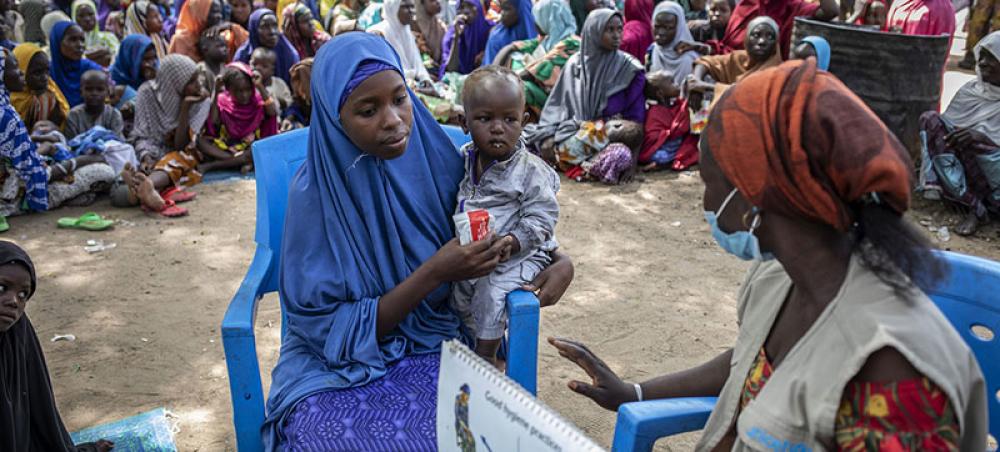Just Earth News | @justearthnews | 16 Oct 2021, 06:17 am Print
 WFP
WFP Image: WFP/Arete/Siegfried Modola
New York: Displaced families in Nigeria’s northeast are “knocking on the door of starvation”, the UN World Food Programme (WFP) said on Friday.
The alert follows years of insecurity linked to non-State armed groups that have disrupted livelihoods and forced hundreds of thousands of people to flee in search of shelter.
More than one million children are already malnourished, according to WFP spokesperson Tomson Phiri.
He told journalists in Geneva that the agency may have to cut rations to more than half a million women, men and children in northeastern Nigeria by the end of the month, unless at least $55 million in new funding is found. 
“We are facing very severe levels of hunger that we have witnessed since, this is probably the highest that we are witnessing since the crisis exploded in 2016. Approximately 4.4 million people are facing acute food insecurity in the conflict-affected states of Borno, Adamawa and Yobe.”
Deciding who eats
Mr. Phiri said that COVID-19 had pushed up food prices and limited food supply, and that the number of internally displaced people surpassed two million in September – reaching another grim milestone.
Amidst the socio-economic fallout from COVID-19, high food prices and limited food supply, WFP’s Regional Director for West Africa Chris Nikoi observed during a recent visit that “cutting rations means choosing who gets to eat and who goes to bed hungry”.
“We are seeing funding for our life-saving humanitarian work dry up just at the time when hunger is at its most severe”, he warned, reminding that WFP’s food assistance is “a lifeline for millions whose lives have been upended by conflict and have almost nothing to survive on”.
Feeding people in search of safety
The number of people forced to flee their homes searching for safety in northeast Nigeria has been rising steadily.
“Cutting food assistance will be a painful decision for humanitarians as it will negatively affect children, women and men uprooted from their homes due to continued violence” said Edward Kallon, UN Humanitarian Coordinator in Nigeria, calling on partners to “step up” support in response to the growing needs.
Keep lifeline flowing
For five years, WFP has been providing life-saving food and nutrition assistance to the severely food insecure, displaced families in camps, and to vulnerable people living in host communities.
This year, relying on the continued generosity of donor partners, WFP ramped up its response to address rising food insecurity and the impact of COVID-19, targeting 1.9 million displaced people in the country.
However, to sustain humanitarian operations in northeast Nigeria until March 2022, WFP urgently needs $197 million.
“We must act now to save lives and avoid disruptions to this lifeline”, Regional Director Nikoi said.
- United Kingdom launches eVisa for Indian visitors starting today — Here’s what travellers need to know
- Abandoned at birth, Punch the macaque finds global love as crowds flock to Tokyo zoo
- YouTube Premium Lite just got a massive boost — Know all details
- Trump claims he stopped 35 million deaths by stopping India-Pakistan war
- Entrepreneur decides to shut down 16-year old eatery in London, cites harassment and Pakistani attacks





-1763561110.jpg)
